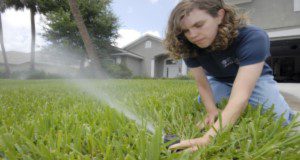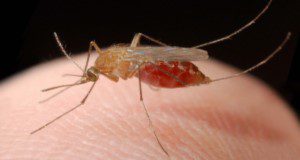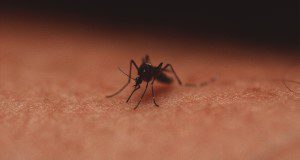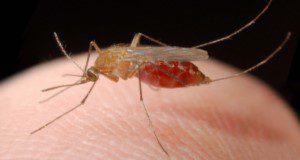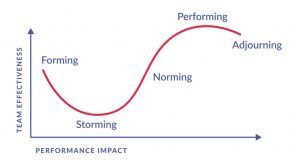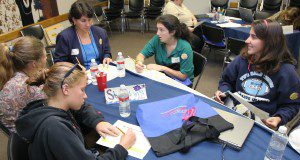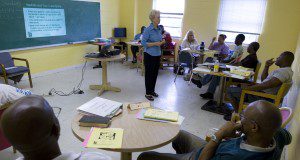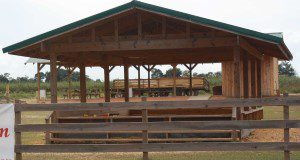Extension professionals and other practitioners address a wide variety of complex issues by providing education and encouraging behavior change using innovative strategies. The importance of prioritizing potential behaviors and selecting those with high expected impact cannot be overemphasized. However, behavior selection can be complicated because there are many solutions for any problem in a particular context. Using an approach drawn from social marketing to develop activities aimed at changing or maintaining people’s behavior, Extension professionals and other practitioners can prioritize behaviors by mathematically calculating anticipated weights that will help focus efforts around key behaviors with the potential to make the greatest impact. This new 6-page publication of the UF/IFAS Department of Agricultural Education and Communication provides an overview of a process to collect and analyze the impact and the likelihood of adoption to help Extension professionals decide on behaviors for a campaign or intervention. Written by Laura A. Warner and John M. Diaz.
https://edis.ifas.ufl.edu/wc375
Tag: Department of Agricultural Education and Communication
Don’t Fake It, Make It! Best Practices for Attending Virtual Events
Continuing the Don’t Fake It, Make It! series to make the most out of virtual conferences and meetings, this fact sheet provides tips specific to attendees. Up to this point, the series has focused largely on the process a host should go through before launching a virtual event. This new 4-page publication of the UF/IFAS Department of Agricultural Education and Communication shifts the focus from virtual host to virtual participant to allow attendees of the virtual event to get the most out of the experience. While the spotlight is on attending virtual conferences in particular, the suggestions included can translate to other virtual meeting spaces. Written by Jarred A. Shellhouse and Lauri M. Baker.
https://edis.ifas.ufl.edu/wc373
Considering Participants’ Personal Wellness in Conservation-Based Extension Programs: Opportunities for Integrative Development and Evaluation
Extension organizations are at the forefront of water resource issues, using educational programs to drive participant behaviors towards water conservation. The effectiveness of these efforts centers on designing programs with considerations of the factors that will change relevant decisions and behaviors among residential landscape water users. We conducted a statewide study to explore the concept of wellness and well-being, and these characteristics’ relationship to water conservation behaviors. Our results show that psychosocial measures influence current and future residential landscape water conservation behaviors differently. Perception of well-being is the more consistent predictor for both current behaviors and future intentions. These results demonstrate an opportunity for those focused on environmental behaviors to pair and embed programs focused on personal well-being to empower communities to work toward achieving conservation goals.
https://edis.ifas.ufl.edu/wc370
Exemplary Youth Leadership Series: Enable Others to Act
This publication series is designed to outline strategies and experiences to expose youth to and engage them with leadership concepts. In this new 2-page publication of the UF/IFAS Department of Agricultural Education and Communication, students will try on aspects of the fourth practice of exemplary leaders: enable others to act. Two quick, low-cost activities are included for implementation with youth. These activities are best suited for students ages 10–18. However, modifications are included for each of the activities to allow for different group sizes, ages, and abilities of the youth participating. Written by Megan Stein.
https://edis.ifas.ufl.edu/wc369
Best Practices for Communicating about Outdoor Residential Water Conservation
Extension communication efforts can be made more effective when following a strategic communication plan. To guide a strategic communication effort, it is imperative to have purposeful messaging along with an understanding of your target audience and communication channel. This new 3-page document, published by the UF/IFAS Department of Agricultural Education and Communication, presents a synthesis of literature highlighting best communication practices in regard to water conservation efforts. Written by Jacqueline Aenlle and Laura A. Sanagorski Warner.
https://edis.ifas.ufl.edu/wc366
Understanding Extension #2: Utilizing Extension Services in School-Based Agricultural Education
The services that Extension offers can supplement lesson plans in the classroom, can help to provide training and support for educators, and can help to build the toolbox of both first-year educators and the veteran educators that want to expand on their current lesson plans and resources. This new 4-page publication of the UF/IFAS Department of Agricultural Education and Communication helps to describe how UF/IFAS Extension can be utilized in agricultural education. Written by Debra Barry, John Diaz, Alyssa Shepherd, Jennifer Patton, and Stephen Gran.
https://edis.ifas.ufl.edu/wc367
What the Agricultural Sector in Florida Needs to Know about Heat-Related Illness (HRI)
Heat-related illness (HRI) can range from rashes, fainting, and cramps to heat exhaustion and heat stroke. It can be fatal, and all outdoor workers in agriculture (as well as those in high-heat indoor settings such as greenhouses) are at risk. This new 6-page publication of the UF/IFAS Department of Agricultural Education and Communication provides basic information on how to recognize the symptoms of HRI, on the underlying physiological processes and related risk factors, and on how to treat it. This publication also provides a list of preventative measures that growers, supervisors, and agricultural workers can follow, along with links to additional resources. Written by Paul Monaghan, Karissa Raskin, Maria Morera, Antonio Tovar, Valerie Mac, and Joan Flocks.
https://edis.ifas.ufl.edu/wc359
Don't Fake It, Make It! Thriving in Virtual Conferences and Meetings
Our ways of working, meeting, and networking have become more virtual than ever before. This series dives into the preparation needed to host a successful virtual experience, as well as steps participants can take to get the most benefit from a virtual conference or meeting. This series will also help hosts understand the value of online conferences and meetings and demonstrate how to create engagement in an online format. This new 4-page publication of the UF/IFAS Department of Agricultural Education and Communication, the first in the series, was written by Lauri M. Baker, Matt P. Benge, Anissa Zagonel, Jarred Shellhouse, Cheryl R. Boyer, and Phillip Stokes.
https://edis.ifas.ufl.edu/wc365
Conducting the Needs Assessment #10: The Delphi Technique
Previous publications in the Conducting the Needs Assessment series outlined why, how, and when Extension educators and other service providers should use needs assessments in their programs. The four preceding publications in the series provide Extension educators and other service providers with specific techniques that can be used in needs assessments, and this new 5-page publication provides an overview of using the Delphi technique to conduct a needs assessment. Written by Laura Warner and Amy Harder, and published by the UF/IFAS Department of Agricultural Education and Communication.
https://edis.ifas.ufl.edu/wc364
Using Social Media to Communicate in an Emergency Situation
The Prevent & Protect publication series focuses on the creation of different material formats to resonate with various audiences and ways to maximize their efficacy in communicating risk to the public about mosquito control. This new 4-page publication of the UF/IFAS Department of Agricultural Education and Communication explains how to engage in effective crisis communication and how to effectively use the Prevent & Protect emergency toolkit in a mosquito-related crisis situation. Written by Ashley Mcleod-Morin, Ricky Telg, Phillip Stokes, Alena Poulin, Shelli Rampold, Angela B. Lindsey, and Sandra Anderson.
https://edis.ifas.ufl.edu/wc363
Understanding Public Perceptions of Mosquito-Related Information Sources and Adapting Research Findings to the Needs of Industry Professionals
The Prevent & Protect publication series focuses on the creation of different material formats to resonate with various audiences and ways to maximize their efficacy in communicating risk to the public about mosquito control. The overview of the Prevent & Protect project, developed by the UF/IFAS Center for Public Issues Education in Agriculture and Natural Resources (PIE Center), can be found in EDIS publication AEC694/WC357, Public Perceptions of Mosquitoes and Mosquito Control. This new 3-page document describes the importance of understanding and adapting to public perceptions of information sources and how scientists can adapt their research findings based upon the needs of professionals in the field to create usable outreach materials. Written by Shelli Rampold, Ricky Telg, Alena Poulin, Sandra Anderson, Angela B. Lindsey, Ashley McLeod-Morin, and Phillip Stokes, and published by the UF/IFAS Department of Agricultural Education and Communication.
https://edis.ifas.ufl.edu/wc358
Public Perceptions of Mosquitoes and Mosquito Control
The Prevent & Protect publication series focuses on the creation of different material formats to resonate with various audiences and ways to maximize efficacy in communicating about mosquito-related risks and mosquito control topics to the public. This new 3-page publication of the UF/IFAS Department of Agricultural Education and Communication provides a background of public opinion on various aspects of mosquito control covered in the Prevent & Protect campaign. Written by Shelli Rampold, Ricky Telg, Alena Poulin, Sandra Anderson, Angela B. Lindsey, Ashley McLeod-Morin, and Phillip Stokes.
https://edis.ifas.ufl.edu/wc357
Icebreakers for Adults
Building rapport is key when creating a team culture. As groups change over time, it is imperative to continually reintroduce and reacclimate new team members to long-standing teammates. Leaders of groups that undergo constant change, like those whose jobs involve volunteers, may find it challenging to find innovative ways to bring people together. Icebreakers are quick, low- or no-cost activities that allow individuals to get to know the people around them and serve as a means to build trust and openness in a low-stakes environment. This new 3-page publication of the UF/IFAS Department of Agricultural Education and Communication outlines strategies to use when building a team culture and gives examples of simple activities to build cultures within teams or groups. Written by Megan Stein and Taylor Nash.
https://edis.ifas.ufl.edu/wc356
Navigating the Unprecedented: Working Remotely Unexpectedly
Working from an alternative location can be a daunting adjustment. Ensuring personal well-being and productivity through unexpected times takes a proactive partnership between employers and employees. This new 3-page publication of the UF/IFAS Department of Agricultural Education and Communication provides some best practices for personal well-being and productivity while working remotely. Written by Megan Stein and Matthew Sowcik.
https://edis.ifas.ufl.edu/wc355
Navigating the Unprecedented: Leading Remotely Unexpectedly
Leaders tend to have a set of assumptions or ideas about how to do their job. As the world moves quickly to social distancing and remote work, leaders rely on their assumptions to navigate this new landscape. Different frames of reference can act as a road map allowing leaders to take the first steps into the unknown. This new 4-page article utilizes these Bolman and Deal’s four frames addressing different aspects of leadership to provide best practices for leading in a remote work environment. Written by Matthew Sowcik and Megan Stein, and published by the UF/IFAS Department of Agricultural Education and Communication.
https://edis.ifas.ufl.edu/wc354
Exemplary Youth Leadership Series: Challenge the Process
This publication series is designed to outline strategies and experiences to expose youth to and engage them with leadership concepts. In this new 3-page publication of the UF/IFAS Department of Agricultural Education and Communication, students will try on aspects of the third practice of exemplary leaders: challenging the process. Two quick, low-cost activities are included for implementation with youth and adults working with youth. These activities are best suited for students ages 10–18. However, modifications are included for each of the activities to allow for different group sizes, ages, and abilities of the youth involved. Written by Megan Stein.
https://edis.ifas.ufl.edu/wc353
Conducting the Needs Assessment #11: Causal Analysis Techniques
This new 3-page publication in the Conducting the Needs Assessment series provides Extension educators and other service providers with an introduction to two techniques that can easily be used when seeking information about relationships between causes and needs: fishboning and cause and consequence analysis. Written by Amy Harder and published by the UF/IFAS Department of Agricultural Education and Communication.
https://edis.ifas.ufl.edu/wc352
Florida Agritourism Building and Fire Codes
Agritourism marries Florida’s two largest industries, tourism and agriculture, to provide an on-farm recreational experience for consumers. Although Florida trails many other states in the number of agritourism operations, the number of Florida farms offering recreational experiences more than doubled from 2007 to 2012. This new 4-page document describes building codes relevant to Florida agritourism operations. Written by Mary Beth Henry and Kathryn A. Stofer, and published by the UF/IFAS Department of Agricultural Education and Communication.
https://edis.ifas.ufl.edu/wc349
Floridians' Engagement in Landscape Best Practices to Protect Water Resources: Information from a 2018 Survey
Extension programs are most effective when informed by a deep understanding of the target audience. To guide programs in Florida’s managed landscapes, especially pertaining to water quality and conservation, faculty from the UF/IFAS Center for Landscape Conservation and Ecology conduct an annual statewide survey. The survey gathers data that includes common landscape elements, neighborhood characteristics, engagement in irrigation and fertilizer best practices, and learning preferences. This new 5-page publication of the UF/IFAS Department of Agricultural Education and Communication presents highlights from the 2018 statewide survey with recommendations for how to use the information. Written by Laura A. Warner, Esen Momol, Claire Lewis, Tom Wichman, Wendy Wilber, and A. J. Reisinger.
https://edis.ifas.ufl.edu/wc345
Applying Culturally Relevant Teaching to Workshops: The Checklist
As the diversity of Extension clientele continues to grow, Extension educators must consider new ways of supporting this population. In this new 2-page article, a follow-up to EDIS article AEC678, Culturally Responsive Teaching: A Framework for Educating Diverse Audience, the authors provide a checklist to serve as a guiding tool when planning workshops and to ensure that participants feel connected to, engaged with, and understood while working toward achieving workshop educational goals. Written by Cecilia E. Suarez, John M. Diaz, and Laura E. Valencia, and published by the UF/IFAS Department of Agricultural Education and Communication.
https://edis.ifas.ufl.edu/wc351
![[Impact × Current adoption levels × Likelihood] = Weight; A social marketing approach to prioritizing potential behaviors for an intervention.](https://edis-news.ifas.ufl.edu/wp-content/uploads/2020/10/wc375-300x160.jpg)



